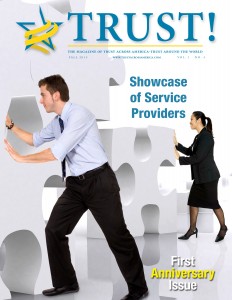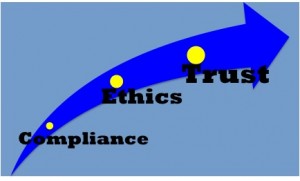It’s almost Week #3 of 2016. How many readers took the advice of Kouzes & Posner on building organizational trust in Week #1 or of Bob Vanourek in Week #2?
This is the third article in a series of weekly ideas to elevate trust in your organization, pulled from our third annual 2016 Trust Poster, 52 Ideas That You Can Implement to Build Trust.
This idea is offered by yours truly (Barbara Brooks Kimmel), the CEO and cofounder of Trust Across America-Trust Around the World.
Agree on a set of core values, practice and reinforce them daily
Or, as Peter Drucker said, “the enterprise must have simple, clear, and unifying objectives.”
Moving towards a trust-based business strategy requires the following steps:
- First, the Board of Directors, then the CEO with C-Suite support must acknowledge and embrace the importance of building trust. The business case has been made but the vast majority of organizations continue to ignore it.
- Regularly communicating the values and culture.
- Mandating and ensuring that those values are meeting the long-term needs of all internal and external stakeholders and across all silos- shareholders, employees, customers, suppliers, community, etc.
- Always “walking the talk.”
If you are looking for an example of a company that embraces its core values, look no further than Starbucks:
With our partners, our coffee and our customers at our core, we live these values:
- Creating a culture of warmth and belonging, where everyone is welcome.
- Acting with courage, challenging the status quo and finding new ways to grow our company and each other.
- Being present, connecting with transparency, dignity and respect.
- Delivering our very best in all we do, holding ourselves accountable for results.
We are performance driven, through the lens of humanity.
If you currently hold a leadership position or aspire to be a trustworthy leader, remember that if leaders haven’t identified the organization’s values, it’s unlikely that trust can work its magic. And by the way, trustworthy leaders also ask the right questions!
The third week of 2016 starts soon! Be sure to spend some time on building trust.
Barbara Brooks Kimmel is the CEO & Cofounder of Trust Across America-Trust Around the World whose mission is to help responsible organizations build trust. She facilitates the world’s largest membership program for those interested in the subject. Barbara also serves as editor of the award winning TRUST INC. book series and the Executive Editor of TRUST! Magazine. In 2012 Barbara was named “One of 25 Women Changing the World” by Good Business International.
Copyright 2016, Next Decade, Inc.





Recent Comments